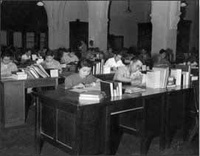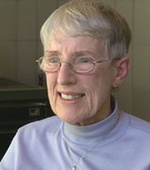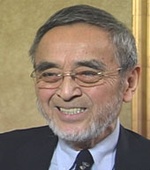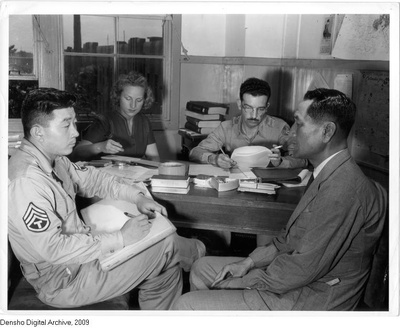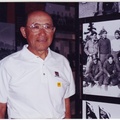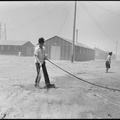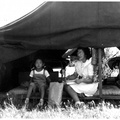“The Nikkei I knew that were involved in the occupation…they were able to work more closely with the Japanese because the Japanese looked upon them as someone that could understand their culture, their history, and their motivation.”—Lucius Horiuchi
Last year Densho interviewed Maynard and Lucius Horiuchi in Sonoma, California. With a generous grant from the Tateuchi Foundation, their interviews became the first in the Densho collection to be translated into Japanese. Their bilingual presence in the Digital Archive is utterly appropriate since the couple met in Japan, where Maynard worked for the U.S. embassy and Lucius served in the foreign service after the war. Theirs is an international story in more than one respect. (Maynard Horiuchi interview transcript, Japanese translation >> Part 1, Part 2. Select "Download Document PDF" to view the full transcript.)
Maynard Cooke Horiuchi traces her father’s side of the family to an ancestor who arrived on the Mayflower, and her mother’s side to an Irishman who immigrated before the American Revolution. Lucius’s grandfather immigrated from Japan to Seattle at the turn of the century. His father came a few years later, and in 1917 brought his bride to Seattle from Japan. Both have illustrious relatives: Maynard’s father was Admiral Charles Cooke, a top-level war planner and commander of the 7th fleet in the Pacific. Lucius’s uncle was the famous artist Paul Horiuchi, and his father, Shigetoshi, helped found the collection of the Seattle Art Museum.
As the daughter of a high-ranking naval officer, Maynard moved frequently. Born in California, by the time she was nine years old she had lived in Washington, D.C.; Kalili Valley, Hawaii; Newport, R.I.; and Guantanamo Bay, Cuba. Lucius points out that she was “traveling the world while I was being raised in Seattle.” When asked if her youthful travel was exciting, she replied, “No, it was just the way of life.”
She does remember several dramatic homes. Outside Honolulu in 1934, the family rented a fabulous estate at Depression-era prices:
We lived at rather a distance from Honolulu, in Kalihi Valley in a beautiful estate which had been built by this man, really, for his wife. There were three buildings there…the first one was the ballroom and living room, and then there were two open spaces, roofed over, one of which we usually had our breakfast in. Then there was a building which was the bedrooms. And, let’s see, it was three or four stories. Then the other building was the laundry and where the maids and cook lived. And all of this backed onto a hillside…The front of the house was right on the stream. The stream came down and there was a waterfall and a pool below, and you could dive from the second story of the house into the pool. And across, from the house, was this walkway, a bridge, over to the main road. And this man who built this was a great party giver. People had to drive up the road and park up around that way, in the back—I think it was a 400 acre estate. So if the party was going really well and he wanted people to stay, he’d pull up the drawbridge on this path, and they couldn’t get home.
Maynard describes her relatively friendless childhood: “I was the Commandant’s daughter, and I’d gotten accustomed to a solitary life.” Children of lower ranking military were discouraged from socializing with children of their superiors, so Maynard’s playmate was her brother Charlie. She was a bookworm, a solitary diversion.
In Cuba, Maynard loved her pony, a gift from her father’s friend. He was an ex-Navy man who had become a prosperous businessman:
I remember one time we went to visit him at his home, which was on the other side of Guantanamo Bay. And we went to the small village there where he had this car on the railroad, the wheels had been put on the rails there. So we traveled up in this automobile to his place, this estate that he had there. He had quite a lovely tropical mansion, and in his garden he had peacocks, tame peacocks all over the place. And also, he served peacock. My sister remembers that we ate peacock there, and said it was very tough, but I don’t remember that.
Densho: It’s almost like a scene out of a movie. This car on rails, and you drive up there, peacocks...
He took a liking to me, this man. His name was Shorty Osment. So after we went back to the naval base, he sent over this pony for me. And this pony must have been used as a cart horse or something, it had terrible saddle sores on it, it was in terrible condition. I don’t know if you know about horses, but if you use the bridle too hard on them, their mouth gets very hardened and they won’t pay attention to what you tell them to do. And when I first got him, if I wanted to get on him, I had to ride him bareback because he had to recover from these saddle sores. I adored him. He was the most wonderful horse in the world, as far as I was concerned.
Then between 1938 and 1940, the family moved back to Washington, D.C., and Maynard’s father was deeply involved in multi-pronged planning for a coming war. In early 1941, they returned to Sonoma, California, and her father took command of the U.S.S. Pennsylvania at Pearl Harbor. Maynard and her mother passed the time night after night by listening to the radio and playing Chinese checkers.
Preliminary reports on December 7 stated that the U.S.S. Pennsylvania was among the ships sunk, and “all hands lost.” To their tremendous relief, Admiral Cooke called his family to say he was alright. His ship had been in dry dock for repairs.
Life for the Horiuchi family was turned upside down on December 7. Lucius believes a family friend who was an FBI employee intervened so that his father was not separated from the family. They were sent to the Puyallup “assembly center” and then Minidoka, Idaho, War Relocation Authority camp. Lucius downplays his time in camp, though he does remember being hurt when he returned to Franklin High School and his former Caucasian friends would have nothing to do with him.
Determined to be defined not as Japanese but as American, Lucius enlisted in the Army immediately after high school. On assignment to the Army Graves Registration Service, he had the solemn duty of bringing home the remains of the first Nisei killed in Italy. After his military service Lucius graduated from Boston College. He had moved east thinking he would encounter less racial prejudice there. A brother-in-law opened the door to an interview with the foreign service, the elite tier of the State Department. Having done well on the exams, Lucius became one of the very few Nisei in the foreign service, whose staff was not only overwhelmingly Caucasian but Ivy League as well.
Though as a diplomat in occupation Japan, Lucius had a different role from other Nisei, he believes they were all effective because of their cultural understanding:
There were more senior foreign service officers that preferred, say, Nikkei, not to serve in Japan. Because the line of thought was that they may be overly sympathetic, overly empathetic towards the Japanese since most of us were, in that period of history, Nisei, children of immigrants. Not that they doubted our loyalty, but may have felt that we may see things in a different color because of our ancestry. And I would say, basically, that’s not true. I think only of the positive aspect. That the Nikkei that I knew that were involved in the occupation at that time, and I was there during the latter part of the occupation, that they were able to work more closely with the Japanese because the Japanese looked upon them as someone that could understand their culture, their history, and their motivation. And I knew any number of Nikkei that were involved in the war crimes trials, and involved with Japanese that were being investigated for what they may have been doing during the war. And I know a number of them that became very close friends of the families of those that were put on trial. And I think in that case, and in all the cases that I know of, it wasn’t because they showed favoritism towards the Japanese, it was only because they were, had more insight into the Japanese and were able to give them a fairer “trial,” so to speak.
Watch video >> Lucius Horiuchi was posted in Tokyo during the occupation
In 1944, Maynard found herself in Tsingtao, China, where the U.S. fleet was based. She had completed Santa Rosa junior college, unhappy at being denied a higher education while her brother, being groomed to follow in his father’s footsteps, attended an expensive private school and then the Naval Academy. The family’s residence at Tsingtao had been abandoned by the Germans. Maynard remembers the chandelier was shaped like a swastika.
As a matter of U.S. policy, her father strongly supported the Nationalists, then locked in civil war with the Communists. Maynard herself had doubts. She saw massive demonstrations against Chiang Kai-shek in Shanghai, and observed how the poor were deprived of medical supplies.
But Maynard kept her opinions to herself as she and her family visited the Generalissimo and Madame Chiang Kai-shek at their headquarters. No motorized vehicles could reach the mountain residence at Kuling, so the party was carried up in sedan chairs. The evening started at the home of General George Marshall (of the Marshall Plan).
We went to their house before dinner, which was going to be at the Generalissimo’s. During the course of the conversation, it turned out that they had taught the Generalissimo how to play Chinese checkers. And Mother immediately said, “Oh, Maynard knows how to play Chinese checkers,” and so they decided to try to see if the Generalissimo would play Chinese checkers with me. So we went and had a very nice dinner, Madame at one end of the table and the Generalissimo at the other. At the end of the dinner, we retired to a little sitting room where they put up this table, and the Generalissimo sat on one side with his military men standing around him, and I sat on the other side in my little Sonoma-made evening dress. And they pulled out the Chinese checkerboard, and it turned out that he only played one corner against the other corner instead of three against three. So the first time that we played, I beat him. So he wanted to play again, so we played again, and I beat him again. And then, well, he wanted another one, so I played him again and beat him again. I think he thought that was enough, and he sort of said, “Han ho,” which means “very good,” I think, in Chinese. And that was the end of the games. And my mother later said, “Maynard, you were so undiplomatic.” But the Generalissimo told Madame to give me a wedding lamp, well, a pair of wedding lamps, and showered favors on me. So he obviously had not taken it amiss, at least, he certainly hid it if he did.
Watch video >> Maynard and her family dine with Chiang Kai-shek
In 1947 Maynard took a job as an editor of classified reports in Washington, D.C., delighted to be independent at last. After five years, she accepted an offer to work in Japan, where the moment she landed she says, “I felt as if I had come home. I just felt immediately at home there.”
Mutual friends had told Lucius and Maynard about each other, but they almost missed meeting. In 1958 Lucius was transferred to Seoul, Korea, and that year Maynard arrived back in Tokyo after a time in Washington, D.C. She had heard of Lucius that he had “nineteen concubines” and had a fabulous Chinese cook. He had heard she was “highly intelligent,” and it was obvious she had “a gentle heart.” Maynard by chance attended an embassy party, where Lucius “shook off all these ladies” to escort her to a night club.
Four dates and forty letters later, Lucius proposed. He says, “It was very fast. We met in August to say hello, I went back in November, and after four dates, we got engaged. I went to Washington, changed my assignment, came back to Tokyo, and we got married in January of ‘59.” When asked if she had any doubts about entering an interracial marriage, Maynard simply said, “I didn’t even think about that.” When he was asked, Lucius replied that his father-in-law was completely open-minded.
Well, yes and no. By that time, I had met enough important men in the world that, like the old poem, “To deal with fools and kings,” you know. And certainly you may be a little uneasy because you’re meeting the father of the woman you love, the one you’re going to marry, plus, he had been a prominent military officer during World War II. But he put me at ease very quickly. He was a matter-of-fact kind of guy, and in his heart of hearts, a very good—I may not say tender—but well, I would. A tender man, because I saw that later when I saw him dealing with Maynard’s younger sister, who had physical problems. He was the most gentle, sweetest man I’d ever seen in my life, the way he treated his daughter, a cerebral paralytic who was damaged when she was born, in the naval hospital. And so when we flew down here, then I met the mother, and the mother wouldn’t introduce me around as Maynard’s fiance, and that hurt me a little. But I’d been around enough grande dames and older Caucasian that had prejudice, or some prejudice, and I knew it would work itself out. And it did; eventually I became her favorite son-in-law.
Watch video >> Lucius is asked if he was nervous meeting his father-in-law
In turn, Lucius’s mother had some misgivings at first, having heard of Caucasian women getting divorced, but she too came around quickly. In their full interviews, the couple describes their work in service of the United States, their lives as parents, and their profoundly international lives.
When asked about his life values, Lucius concludes:
There’s something called nintai. And I think nintai really means “endurance,” which I have always interpreted to mean, “Accept what comes your way and make the best of it,” and I think that’s been the basic philosophy of my life. I’ve always been an optimist, and regardless of what difficulties, challenges and tragedies that may occur in my life, you get over them as soon as you can. There are always elements within those tragedies that can help you move forward. And whether it’s in your career and not making ambassador, but saying, “My God, I did well enough.” I mean, for Nisei of my generation and age, I got involved in a profession that was unique, that most people find more than of passing interest, and would gain enough respect and appreciation for my work. But added to the nintai, I think the concept of the Japanese, of girininjo, of always paying due respect and thankfulness to the powers to be, and your parents and your family and your friends, has always been a principle, and basic principle in my life. And I give Maynard a lot of credit, too, because she’s very firm in her moral beliefs that I’ve implemented in my life as well.
* This article was originally published on Denshō: The Japanese American Legacy Project.
© 2009 Denshō


